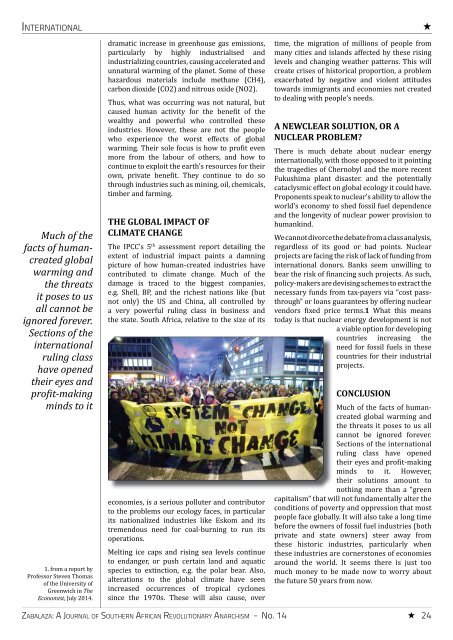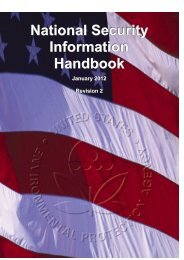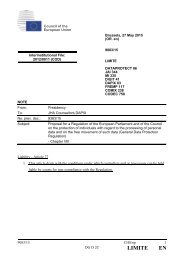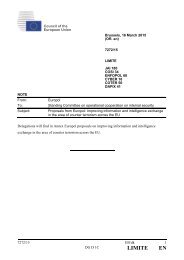[BCBMB[B
zabalaza14
zabalaza14
Create successful ePaper yourself
Turn your PDF publications into a flip-book with our unique Google optimized e-Paper software.
INTERNATIONALMuch of thefacts of humancreatedglobalwarming andthe threatsit poses to usall cannot beignored forever.Sections of theinternationalruling classhave openedtheir eyes andproit-makingminds to it1. from a report byProfessor Steven Thomasof the University ofGreenwich in TheEconomist, July 2014.dramatic increase in greenhouse gas emissions,particularly by highly industrialised andindustrializing countries, causing accelerated andunnatural warming of the planet. Some of thesehazardous materials include methane (CH4),carbon dioxide (CO2) and nitrous oxide (NO2).Thus, what was occurring was not natural, butcaused human activity for the beneit of thewealthy and powerful who controlled theseindustries. However, these are not the peoplewho experience the worst effects of globalwarming. Their sole focus is how to proit evenmore from the labour of others, and how tocontinue to exploit the earth’s resources for theirown, private beneit. They continue to do sothrough industries such as mining, oil, chemicals,timber and farming.THE GLOBAL IMPACT OFCLIMATE CHANGEThe IPCC’s 5 th assessment report detailing theextent of industrial impact paints a damningpicture of how human-created industries havecontributed to climate change. Much of thedamage is traced to the biggest companies,e.g. Shell, BP, and the richest nations like (butnot only) the US and China, all controlled bya very powerful ruling class in business andthe state. South Africa, relative to the size of itseconomies, is a serious polluter and contributorto the problems our ecology faces, in particularits nationalized industries like Eskom and itstremendous need for coal-burning to run itsoperations.Melting ice caps and rising sea levels continueto endanger, or push certain land and aquaticspecies to extinction, e.g. the polar bear. Also,alterations to the global climate have seenincreased occurrences of tropical cyclonessince the 1970s. These will also cause, overtime, the migration of millions of people frommany cities and islands affected by these risinglevels and changing weather patterns. This willcreate crises of historical proportion, a problemexacerbated by negative and violent attitudestowards immigrants and economies not createdto dealing with people’s needs.A NEWCLEAR SOLUTION, OR ANUCLEAR PROBLEM?There is much debate about nuclear energyinternationally, with those opposed to it pointingthe tragedies of Chernobyl and the more recentFukushima plant disaster. and the potentiallycataclysmic effect on global ecology it could have.Proponents speak to nuclear’s ability to allow theworld’s economy to shed fossil fuel dependenceand the longevity of nuclear power provision tohumankind.We cannot divorce the debate from a class analysis,regardless of its good or bad points. Nuclearprojects are facing the risk of lack of funding frominternational donors. Banks seem unwilling tobear the risk of inancing such projects. As such,policy-makers are devising schemes to extract thenecessary funds from tax-payers via “cost passthrough”or loans guarantees by offering nuclearvendors ixed price terms.1 What this meanstoday is that nuclear energy development is nota viable option for developingcountries increasing theneed for fossil fuels in thesecountries for their industrialprojects.CONCLUSIONMuch of the facts of humancreatedglobal warming andthe threats it poses to us allcannot be ignored forever.Sections of the internationalruling class have openedtheir eyes and proit-makingminds to it. However,their solutions amount tonothing more than a “greencapitalism” that will not fundamentally alter theconditions of poverty and oppression that mostpeople face globally. It will also take a long timebefore the owners of fossil fuel industries (bothprivate and state owners) steer away fromthese historic industries, particularly whenthese industries are cornerstones of economiesaround the world. It seems there is just toomuch money to be made now to worry aboutthe future 50 years from now.ZABALAZA: A JOURNAL OF SOUTHERN AFRICAN REVOLUTIONARY ANARCHISM - No. 14 24







